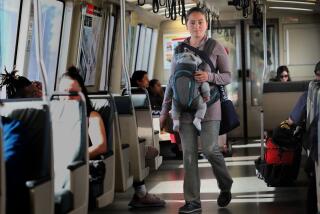TCA Adopts ‘Electronic Wallet’ Deal for Drivers
- Share via
Dismissing reservations that they may be straying from their stated mission, directors of Orange County’s public toll roads Thursday approved a deal with a Canadian firm that hopes to market FasTrak transponders as “electronic wallets.”
Hoping to counter sometimes lagging toll revenue, directors of the Transportation Corridor Agencies agreed to an unusual business deal that will let motorists use transponders to pay for a variety of products and services, from medicine to dry cleaning. Only one other tollway agency in the nation, the Pennsylvania Turnpike Authority, operates a similar program, TCA spokeswoman Lisa Telles said.
Proponents say the resulting income will allow TCA to pay off its $3.5-billion bond debt early and open the roads to nonpaying drivers. Critics, however, said the deal is fraught with potential liabilities and administrative headaches and that it could alienate toll-road customers who already resent having to pay to drive. They asked that the matter be studied further.
TCA Director Beth Krom, who is also an Irvine councilwoman, said recently, “I feel derelict in going ahead with this without knowing more about what will actually be happening. We should make sure that we’re not going to get sued and that we’re going to be making our customers happy.”
In the end, supporters of the swipe-and-go payment program won out, and TCA directors approved the deal overwhelmingly.
Under the agreement with Toronto’s Sirit Technologies Inc., manufacturer of the FasTrak transponders that TCA customers use, the agencies will help market use of the devices to such businesses as drive-through pharmacies, gas stations, dry cleaners and parking garages. The TCA will collect a fee for each transaction, while Sirit will benefit by charging businesses for the installation of transponder readers.
While proponents tout transponder spinoffs as a convenience for toll-road customers, it isn’t free: TCA will charge a transaction fee for each purchase. At McDonald’s, for instance, the customer will pay an extra 23 cents for each transaction.
Also, in a related deal Thursday, toll officials will expand an existing agreement with McDonald’s Corp. so that toll-road customers can charge meals to their transponder toll accounts.
The windshield-mounted transponders allow motorists to drive along the San Joaquin Hills, Eastern and Foothill toll roads without stopping at toll booths. The devices trigger a special radio sensor that automatically charges the toll price to a patron’s credit-card account. FasTrak transponders are also used for travel on the 91 Express Lanes, but that operation is privately owned and not overseen by Orange County officials.
Peter Buffa, a TCA consultant and former Costa Mesa councilman who has championed the deal with Sirit, said there is no way to predict exactly how much revenue the TCA might gain from the deal. However, the benefits are “potentially significant” as long as the TCA moves quickly enough to establish itself in the market, he said.
The TCA’s agreement with Sirit is for two years, but the toll agency can back out of it if no business deals with retailers are struck within the first six months. The contract also allows TCA to sever the contract if Sirit engages in any activity that damages the toll agency’s business reputation or exposes it to “significant” financial liability.
Support for the Sirit contract was particularly strong among directors of the San Joaquin Hills toll road, where revenue has lagged for years.
“We’re not going to be able to pay off our construction bonds solely with toll revenue,” said TCA Director Todd Spitzer, an Orange County supervisor. “That’s why we need this alternate source of revenue. That’s the reason. There’s no way to sugar-coat it.”







